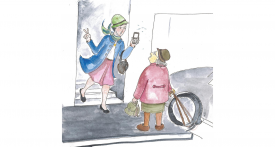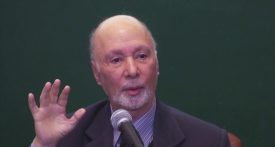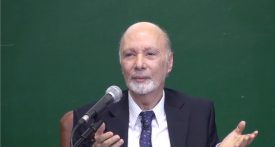Search results for tag "Practice" - 10 answer(s)
304
Vote
 This post is a follow-up to a previous post entitled “Ethics in a delicate situation: what do you think?”, which presented a hypothetical case study together with a poll, to which you can still participate if you haven’t done so yet (you might want to do so before reading further). Let us begin with a few remarks about the poll results: On both the French and the English versions of the site, choice e (There are no fundamental differences between helping others and devoting sufficient time to one’s spouse: Jack could have spent that evening exclusively with his wife and still be practicing ethics) has been by far the most popular, followed by choice b for the French version (The well-being of one’s spouse should always take precedence. It should be preferred to the well-being of others and even to one’s own well-being) and choice a for the English version (Efforts of generosity always meet obstacles that must be overcome to allow progress: Jack should have expected Kelly’s opposition and prepared himself better for this test in order to prevent any conflict).
Read more
269
Vote
Read this anecdote, answer the two poll questions and share your comments for 2 weeks! On March 9, an article will be posted, presenting several notions relevant to this discussion along with some guidelines for a good practice.
Let us note at the outset that the point is not to reach an answer that would be “right” or “wrong” in the absolute sense. Reality is far too complex to be summarised in that way. This is the toy model of a “clinical case study”: a virtual exercise in the form a poll aimed exclusively at promoting reflection and exchanges.
Read more
250
Vote
I noticed recently, as I was listening to one of these debates we all too often get to see on TV or hear on the radio, how little Truth is expressed in these exchanges. Perfectly malleable minds, weaving through this verbal universe; ideas and concepts going back and forth, one after the other, but carrying no weight, relieved of all reality, emptied of all knowledge.
Why is that? Because knowing, truly understanding, involves more than this mere game of ideas and theoretical scaffolding, no matter how ingenious and brilliant. Knowing involves a personal experience of reality, it involves the challenge of confronting our convictions and beliefs to reality.
Read more
243
Vote
 To complete and sharpen my self-portrait, I decided to consider others as mirrors. The idea was to observe people’s behaviour towards me in order to find clues about myself and about what to focus on to further perfect myself spiritually. Having made this resolution, I got ready for my day and went off to work. As I pulled the car out of the garage and was about to turn into the street, I realized I had forgotten my cell phone. I left my car on the sidewalk right outside the gate and rushed inside to get my phone. I rushed back out less than two minutes later, just in time to find the neighbourhood grumpy old lady vehemently banging her walking stick against the metal rim of my front wheel. “It happens every time!” I said to myself. “Every single time I leave my car for one second on the sidewalk she pops up out of nowhere and starts banging on it!” This time, I wasn’t going to take it and so I gave her a piece of my mind: “I never leave my car out here for more than two minutes, this is completely out of line, it’s technically my driveway”, etc.
Read more
278
Vote
 It is always possible to limit one’s knowledge of the principles that constitute any given philosophy, spiritual thought, religion or psychological theory to a purely theoretical level. This approach sometimes suffices to help give a general direction to one’s life and provide a reassuring framework by lending meaning to one’s experiences. To set into motion a genuine process of change in oneself it is however necessary to enter the practical realm of spirituality, namely, the process of perfection of the soul. But where to begin? What exactly should one do? The point here is not to put into practice religious rituals or to apply predefined moral prescriptions. In fact, spiritual work begins with a self-discovery. The first step is to observe oneself, as if from the outside, to carefully analyse oneself, and to “accurately assess [one’s] own attributes, positive qualities, strong points, flaws, weak points, etc.”. This approach requires a good amount of sincerity as it involves acknowledging and confronting one’s faults. It also requires a minimum of self-confidence in order not to lose hope in the face of one’s weaknesses. Finally, it is essential to keep in mind that this inventory of our personality must be done in the context of the process of spiritual perfection. In other words, the criteria with which we would measure our strengths and weaknesses and our qualities and faults should not be dictated by social trends but by ethical and spiritual values. For example, an introverted or reserved personality can appear, socially speaking, as a weak point, whereas it is neither a fault nor a quality spiritually speaking. It can even be an asset, as introverted people often have a greater capacity for self-analysis.
Read more
311
Vote
If someone was to ask us: “are you ever negligent?”, we would probably be tempted to nod in agreement, if only to make sure we do not come out as smug. But things would get much more complicated if we were asked to answer the follow-up question: “but in which areas and in what ways are you negligent?”. Because how are we supposed to identify in which situations we tend to be negligent and to what degree (occasionally/systematically, minor/serious), when by definition, negligence results from a lack of attention and thus cannot be clearly and directly perceived? Or since, in other words, we do not attach any importance to it.
Of course, there are times where the thin voice of our moral conscience will make itself heard in the back of our mind, right when we are about to do something negligent. But it will likely instantaneously drown in the nonstop muddy flow of our quasi-automatic thoughts, and lack the energy to push us to exercise our willpower to thwart that negligence.
Read more
289
Vote
If you are like me, there are certain people whose company you seek and enjoy, and then there are all those whose company is a burden and awakens negative feelings within you. But what causes such feelings? And what is the best way to deal with them? Here is the result of my personal introspective analysis.
A closer look at these negative feelings quickly led me to the conclusion that they were morally “suspicious”. To put it simply, I observed that they were often—if not always—the consequence of my own moral failings. There is no doubt, for example, that my strongest aversions are caused by feelings of rivalry or injured self-esteem. All it takes for me to want to punch a person in the face, is a smile or a comment I interpret as condescending!
Read more
297
Vote
The parable of the Good Samaritan in the Gospel of Luke is brought up in the course of a discussion between Jesus and a man of law with regard to the question of what one ought to do “to inherit eternal life”. Referring to the answer given by the law the man quotes a verse […]
Read more
1354
Vote
As far as spirituality goes, a purely theoretical approach to principles, detached from actual practice, will not do. Not only is it inefficient, it constitutes a genuine impediment to spiritual progress: that of smugness or spiritual “superioritism”. Professor Bahram Elahi spells this out in the following excerpt from a lecture given at the Sorbonne (Paris) […]
Read more
1787
Vote
Ostad Elahi used to define his teachings as a new medicine of the soul: one that is adapted to the true nature of human beings and adheres to the law of causality governing both their spiritual and material lives. The spirituality he practiced was natural spirituality, and he viewed the process of spiritual perfection as a curriculum.
The excerpts presented here are drawn from a lecture given at the Sorbonne in March 2011, in which Professor Bahram Elahi revisits various aspects of Ostad Elahi’s philosophy. Rephrasing them in a simple and direct manner, he relates these points to fundamental questions and examines them from a rational standpoint.
Read more
« Prev - Next »
|

 News
News Podcast
Podcast













Recent Comments